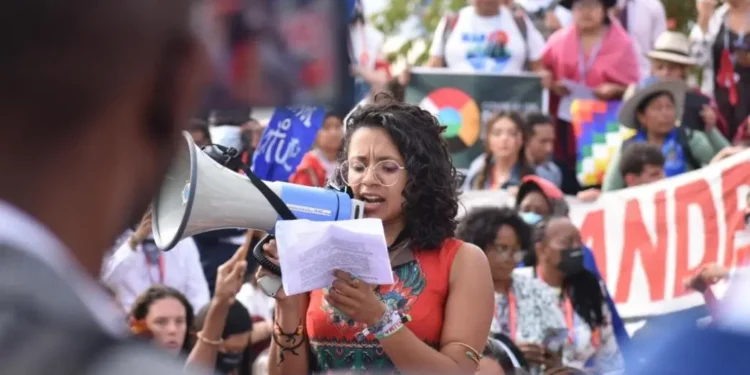Civic space crucial for resource governance and energy transition – but it’s endangered
New research finds that civic space violations are on the rise in countries with extractive industries, including the host of 2024’s COP29 climate conference.
On 23 July 2023 Azerbaijani security forces violently detained scholar and political activist Gubad Ibadoghlu on fabricated charges of financial impropriety. Since then, authorities have attempted to connect him with an extremist religious group, charges that could carry a sentence of 12 years in jail. The likely reason for this persecution is Ibadoghlu’s work as an advocate for responsible natural resource governance and accountability in the Azerbaijani extractive industries.
Gubad Ibadoghlu, Azerbaijani scholar and human rights defender
Despite winning hosting rights for this year’s COP29 UN climate summit, Azerbaijan is no stranger to human rights abuses and censorship. The oil and gas industry dominates the country’s economy, bringing in around 90 percent of export revenues and 60 percent of the government’s budget, supporting a governing elite linked with corruption and authoritarianism. In this context, authorities have routinely quashed citizens’ efforts to bring meaningful public accountability to oil, gas and mining revenues, with the country notably withdrawing from the Extractive Industries Transparency Initiative (EITI) in 2017 after it failed to meet the initiative’s requirements on civil society engagement.
The Extractive Industries Transparency Initiative (EITI) is a global standard for the good governance of oil, gas and mineral resources. In each of the more than 50 EITI implementing countries, governments and companies disclose a range of extractive industry data under the oversight of a multistakeholder group, composed of government, companies and civil society. The multistakeholder group supports outreach activities with extractive industries stakeholders to ensure that disclosures feed into public debate and scrutiny of oil, gas and mining policies and their implementation. (Gubad Ibadoghlu was for a time a member of EITI’s international board.)
Civic space in danger
Unfortunately, Azerbaijan is not the only oil, gas or mineral producer where civic space—the environment that enables civil society to play a role in the political, economic and social life of a country—is under threat. Over the last 12 months, NRGI has tracked threats to civic space in the 57 countries that implement the EITI using reporting from the Business & Human Rights Resource Center, CIVICUS and the RSF Barometer. In the last year alone abuses against human rights defenders and journalists, or strategic lawsuits against public participation (SLAPPs), were recorded in 67 percent of EITI implementing countries (38 countries), with abuses directly linked to the extractive industries in 13 countries.
Baku, Azerbaijan • Ana Flasker via Shutterstock
In Niger, authorities arbitrarily detained Abdoulaye Seydou and Adamou Idrissa, both members of the ROTAB/Publish What You Pay-Niger coalition, for their peaceful and legitimate defense of human rights. In the Philippines, radio broadcaster Cresenciano Bunduqui was shot dead outside his home after he had spoken out about a recent oil spill, illegal gambling and local political issues on his radio show. In Kazakhstan, community members reported that residents protesting a gold project were brutally dispersed by company security following environmental protests over a failed public hearing concerning the environmental impacts of the plant. In Mexico, human rights defenders Antonio Díaz Valencia and Ricardo Arturo Lagunes Gasca disappeared after engaging in community negotiations over the operations of the Las Encinas iron mine.
These incidents illustrate a broader trend. The 2023 CIVICUS Monitor scoring shows that the percentage of the world’s population living in countries with closed civic space is the highest since 2018 when CIVICUS started tracking civic space conditions, rising from 26 to 31 percent during this period.
Fertile ground for corruption
The ramifications of this kind of violence for public accountability are particularly troubling. Where citizens and journalists are afraid of what might happen if they speak out, they hold back from analyzing the extractive industries and publishing the facts. This provides cover for some elites and other unscrupulous actors to engage in corruption. It also means that mistakes and mismanagement in day-to-day extractive operations go unreported, increasing the likelihood of serious environmental and social impacts, and undermining the optimization of revenues and other benefits that extractive projects might bring.
Moreover, oppression that takes place alongside actual improvements in transparency (such as the data produced by EITI processes) adds the specter of “zombie transparency”—disclosures that produce a veneer of good governance but upon which no one takes action. In its most severe form, zombie transparency can undermine confidence in data and disclosure more broadly, playing into the hands of those who seek to divert financial flows from the extractive industries to suit their own personal agendas.
EITI fights back
For these reasons the EITI board established a civil society protocol in 2015. The protocol protects civic space by specifying criteria by which the EITI Board can assess whether civil society is able to adequately participate in a country’s EITI processes and express views related to natural resource governance. These include tests relating to the abilities of civil society actors: to express opinions without restraint or reprisal; to operate freely; to communicate and cooperate with each other; to be fully, actively and effectively engaged in all stages of the EITI process; and to access and contribute to public decision-making. These safeguards have sharp teeth, and the EITI board has suspended several countries from the initiative and rejected others’ applications to join in cases where countries’ civic space is closed.
Credit: EITI
Further, in the latest update to the EITI standard in 2023, EITI members agreed that multistakeholder groups that govern national EITI processes should monitor adherence to the protocol. Speaking at the EITI global conference in Dakar last year, NRGI president and CEO Suneeta Kaimal welcomed this development, noting that “the EITI community can use this requirement to support multistakeholder groups to actively monitor civic space, amplify and address threats.”
The work ahead
Despite these advances within EITI, the situation remains bleak. In 2022 colleagues from NRGI, Publish What You Pay, Oxfam America, the International Center for Not-for-Profit Law and the Institute for Development Studies gathered to explore new strategies for protecting civic space. Unfortunately, two years later, many of the recommendations from that work still require implementation:
- The new EITI board, in place since June, should commit to more efficiently translating EITI standards into implementation; and to enforcing the standards it sets—even in tough cases.
- Bilateral and philanthropic funders should reinforce existing mechanisms for dialogue and participation where possible. Recent changes in donor priorities linked to the energy transition have resulted in an underfunding of efforts to ensure robust governance and good decision making. But these are more needed than ever as governments and companies make important strategic shifts based on changing global energy patterns.
- Extractive and energy companies should speak up and support the protection of civic space, which is key to positive economic outcomes. Investors should strengthen criteria related to civic space protection in their business decisions, and encourage companies and governments to ensure the protection of civic space as essential to environmental, social and governance (ESG) considerations and a positive investment climate.
- International financial institutions should make greater use of their lending power to call for action to support civic space.
Civic space is a necessary ingredient for public scrutiny and effective resource governance. If the citizens of producer countries are to benefit from their natural resources amid the energy transition, civic space must be protected.








